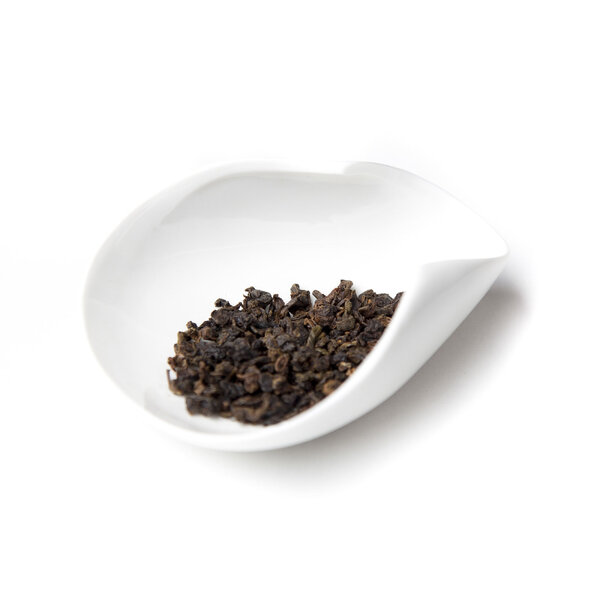Gaba Oolong Diamond
-
Harvest Year 2025
-
Country of Origin Taiwan
-
Type of Tea Oolong
-
Total Price: from 16.00 € (including VAT)
Gaba diamond oolong has a very interesting sweet specific taste and aroma, reminiscent of dried prunes and fresh biscuits. It is worth experimenting with the length of the infusion and the temperature of the water, it gives a lot of infusions. The wilted tea leaves, light brown in colour with a sweet honey scent, are hand-picked and are of organic quality.
In 1987, Dr. Tsusida, a Japanese invented a way of processing tea leaves to produce tea with a high GABA amino acid content. GABA amino acid is a natural growth hormone stimulator that has powerful anti-aging effects, helping to improve physical and mental fitness. Growth hormone also increases collagen production, helping to maintain beautiful, smooth and elastic skin without wrinkles. It helps in lowering blood pressure and regenerating the body. It increases serotonin levels and thus positively affects a person's mood and sleep.
GABA tea is popular among those seeking a natural way to support their physical and mental well-being.
To be called a GABA tea, the tea must contain a minimum of 150 mg of GABA amino acid per 100 g of leaf. Our Taiwanese GABA teas have approximately 250 mg/100 g.
REGULATION (EC) No 1924/2006 OF THE EUROPEAN PARLIAMENT AND OF THE COUNCIL of 20 December 2006 on nutrition and health claims made on foods unfortunately prohibits us from making more specific health claims, except for those approved by it. Therefore, we do not make any other claims, even those that have been known and proven over the centuries.
Tea Preparation for Multiple Infusions
-
Tea Quantity 5 g
-
Water Quantity 200 ml
-
Water Temperature 100 °C
-
Brewing Time 60s, 30s, 60s, 90s, 120s
-
Number of Infusions 4 - 5
-
Tea Characteristic Mierne povzbudzujúci
Tea Preparation for Single Infusion
-
Tea Quantity 5 g
-
Water Quantity 0,5 l
-
Water Temperature 100 °C
-
Brewing Time 2 - 3 min.
-
Number of Infusions 1 max. 2
-
Tea Characteristic Mierne povzbudzujúci
GABA was first developed in Japan in 1983 by Dr. Tsushido and his team at the National Agricultural Research Institute in Japan. The innovation was a special anaerobic fermentation process that increases the natural content of gamma-aminobutyric acid (GABA) in tea leaves. Since then, GABA tea has become a recognized category within Japanese tea culture and is known for its unique processing method and composition.
GABA (gamma-aminobutyric acid) is a naturally occurring compound in the human body that belongs to the so-called neurotransmitters - substances that transmit signals between nerve cells. It functions as the main inhibitory neurotransmitter in the central nervous system, which means that it reduces the activity of neurons and contributes to the balance of nerve transmission.
Its role is widely recognized in neuroscience and physiology as part of the body's natural regulatory mechanisms.
GABA is naturally produced in tea through a special processing method in an oxygen-free environment (called anaerobic fermentation), which activates natural enzymes in the tea leaves.
In order for a tea to be labeled "GABA tea", it must contain at least 150 mg of GABA per 100 g of dry matter. In practice, values range from 150–450 mg / 100 g. In one experiment a few years ago, we even managed to achieve a value of 600 mg / 100 g.
GABA is a common component of the human body and is also found naturally in some fermented foods such as kimchi, tempeh, fermented rice or some types of tea.
More information about GABA:
https://sk.wikipedia.org/wiki/Kyselina_gama-aminomaslov%C3%A1
https://en.wikipedia.org/wiki/GABA
https://www.sciencedirect.com/science/article/pii/S1756464619305936
https://www.psychologytoday.com/us/blog/sleep-newzzz/201901/3-amazing-benefits-gaba
